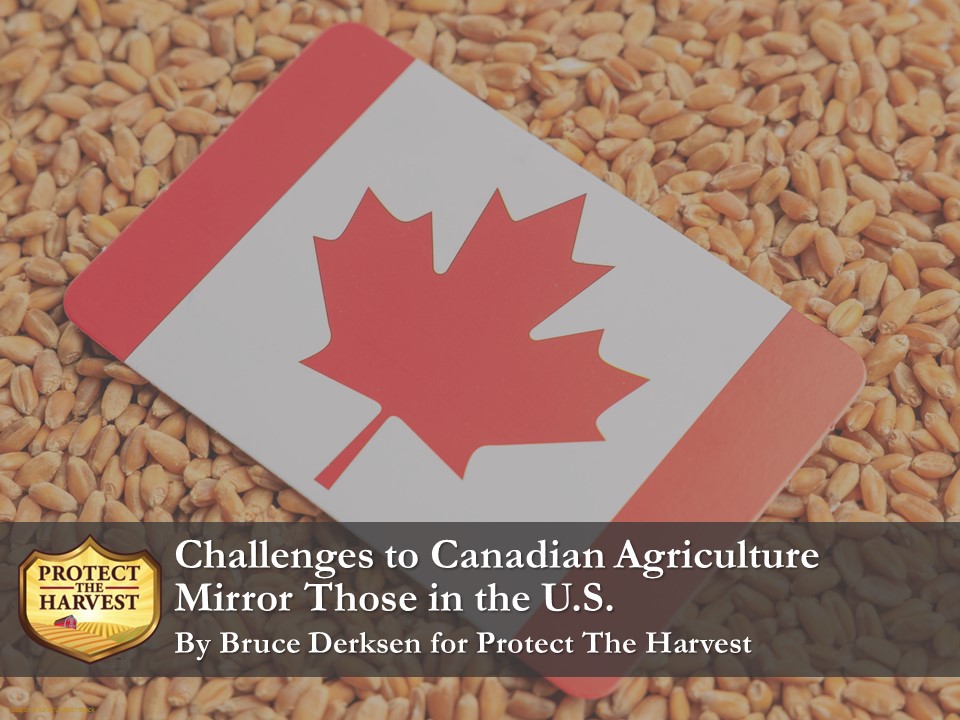By Bruce Derksen for Protect The Harvest
All over North America, those participating in agriculture, be it grain farming, livestock production, or another niche of the overall industry, consistently face significant challenges. Many originate from Mother Nature herself, in the form of extreme temperatures, droughts, floods, wildfires, hurricanes, tornadoes, ice storms, blizzards, or other climate and weather-related confrontations.
Unfortunately, not all agricultural challenges come from outside the human scope; many are directly man-made. It’s likely some were originally well meaning, others based on a lack of knowledge, with some constructed strictly to advance personal beliefs and agendas.
Like the U.S., challenges facing those north of the 49th parallel include pressures from institutions of learning, animal rights extremists, environmentalist activists, climate change alarmists, and anti-meat advocates, among others.
Talking and action points range from those calling for strictly vegan menus at university tables, those fronting as livestock farm employees, or participating in ‘open rescues’ and sit-ins, plus nonprofit organizations proudly demanding the abolishment of all animal domestication.
Advanced Learning Feeding Controversy
Recent reports by the government backed Canadian Broadcasting Corporation (CBC), say universities across Canada are ramping up production and delivery of plant-based food in their dining halls, claiming these actions are in response to an ongoing, increasing demand from students for more variety and improved environmental sustainability.
At the University of British Columbia, 55% of dining hall food is already plant-based with school goals targeting 80% by 2025. Concordia University in Montreal plans to institute a reduction of 30% in its meat, dairy and egg purchasing. A Halifax based university’s goal is to reach at least 50% plant-based food options by 2030, and the University of Toronto’s plant-based food services offerings now account for 61% of their student meals.
It’s not uncommon to read slanted, or grossly misrepresented public relations material from Canada’s large and small universities touting plant-based menu items as the optimal way to improve the environmental footprint and help achieve net zero emission commitments by 2050.
Government Acting Outside Their Realm
On a separate targeting front, hiding behind a largely veiled attempt to push their agenda of reducing red meat consumption, the Canadian federal government has quietly endorsed Entomophagy, the practice of eating insects. They’re contributing 8.5 million dollars to the construction of a commercial plant in London, Ontario to produce protein derived from crickets. This ‘human food’ will include insect-based powders and snacks, crickets and mealworms deemed edible insects, red ant pudding, and crispy beetles.
Admittedly, different regions of the world host cuisines and food cultures as diverse as their map placement, and while everyone has a right to eat and appreciate their own cultural cuisine, this unique food culture change is being driven by the federal government, a powerful entity who shouldn’t be involved in this type of mission. Not surprisingly, evidence of consumer pushback to these food choices exists, but when governments attempt to sway consumption without presenting equal sides of the story, it’s hard to imagine where the levels of insect consumption will be in both the short and long term.
Trendy but Uninformed Social Forces Take Sides
Even leading foodie websites are lining up for their turn at bat against the Canadian beef industry by citing greenhouse gas emissions and their effect on sustainability. Many claim worries about the carbon footprint of red meat, pointing to the UN’s food and agriculture organization stating beef production is responsible for 41% of all livestock sector GHG emissions.
These prominent food websites have singled out beef, quoting statistics from the World Resources Institute to prove raising beef creates 20 times more GHG per gram of edible protein than plant proteins while requiring 20 times more land. They employ trendy, sustainability-based slogans to prey on the often-well-meaning desires of consumers.
Some groups believe replacing beef with crops for human consumption will be healthier for people and less damaging to the environment. They’re unaware or deliberately deny this strategy would result in a loss of natural grasslands, reduced biodiversity, the release of soil carbon, and the potential loss of at-risk species. Beyond this, the environmental and financial costs involved in converting these native grasslands to cropland would be extreme with many needing continual irrigation and replenishment to maintain even average crops.
It’s widely ignored that cattle are often raised on land unsuitable for producing grain, plus they’re able to digest what humans can’t. As ruminants, they turn grass and forage into high quality, nutritious proteins. In parallel, they help preserve natural ecosystems, protect watersheds, reduce erosion, sequester carbon, and enhance plant biodiversity and wildlife habitat.
Those directly involved in Canadian agriculture must be ready to counteract the forces of Mother Nature to keep their animals and crops safe. In today’s social and political climate, they must also keep a sharp eye out for humankind pressures whether they be simple opinionated suggestions or dangerous predatory attacks.



